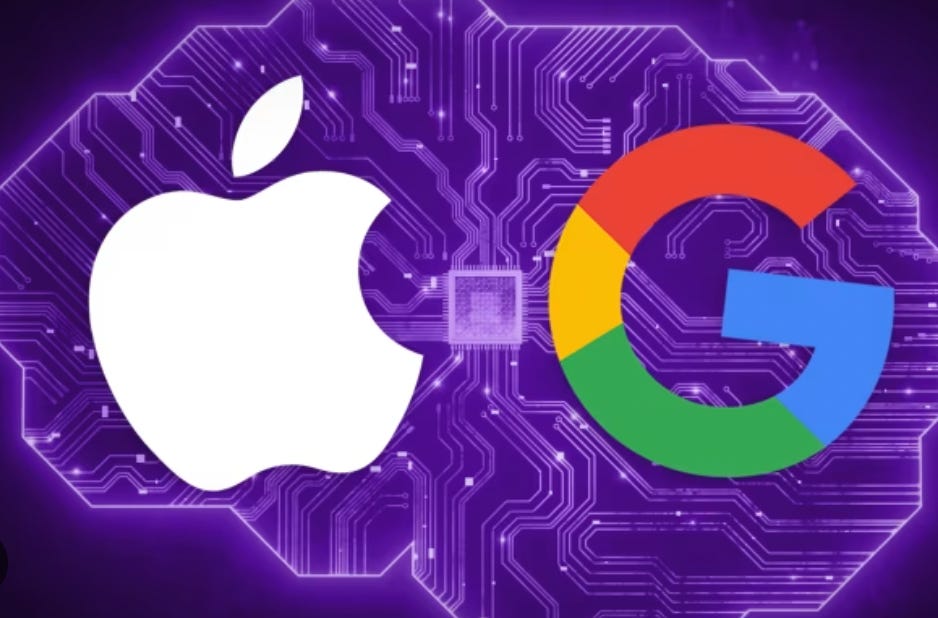- Yaro on AI and Tech Trends
- Posts
- 🔐 The Battle for AI Privacy Apple vs. Google.
🔐 The Battle for AI Privacy Apple vs. Google.
Plus: Protesters Leverage AI to Enhance Antigovernment Efforts, AI Tools, and more.
Get in Front of 50k Tech Leaders: Grow With Us
Hope you're enjoying the long weekend! As AI technology advances, privacy becomes increasingly crucial. In this edition, we compare Apple AI vs. Google AI, examining their privacy measures—a story that will continue to evolve as tech companies expand and collaborate. We also cover Meta's new prediction model and how protesters are leveraging AI in their efforts. Let's dive in!
📰 News and Trends.
Protesters Leverage AI to Enhance Antigovernment Efforts.
Meta’s Multi-Word Prediction Model is a Game Changer.
🧰 AI Tools (Audio Editing)
The Battle for AI Privacy Apple AI vs. Google AI.
📰 AI News and Trends
OpenAI to join Washington lobbying group BSA (Semafor)
In May, Meta began tagging photos with a "Made with AI" label, but photographers reported that real photos were mistakenly tagged. To address these concerns, Meta is now changing the tag to "AI info" across all its apps (TC)
Intel shows off its first fully integrated optical compute interconnect, designed to scale up AI workloads (SiliconAngle)
Ray Kurzweil Still Says He Will Merge With A.I. (NYT)
🌐 Other Tech news
Amazon at 30: What next for 'The Everything Company'? (BBC)
Threads is turning One and already has more than 175M monthly active users (TC)
EU Confirms Tariffs on Chinese-Made EVs (WSJ)
Disinformation researcher Renée DiResta lays out how people’s realities are shaped not by facts and evidence, but by black boxes, niche celebrities, and online communities (Wired)
UK’s Labour Is Winning the Meme War, but Young Voters Think It’s All Incredibly Embarrassing (Wired)
Protesters Leverage AI to Enhance Antigovernment Efforts.

Kenyan protesters are leveraging AI and digital tools to enhance their anti-government efforts. This youth-led movement, initially sparked by the now-canceled Finance Bill 2024 and its unpopular tax hikes, has seen the creation of various AI tools like Corrupt Politicians GPT and Finance Bill GPT to expose corruption and explain legislative impacts. The protesters, predominantly Gen Z and millennials use platforms like TikTok and X to organize, live-stream, and crowdfund, raising over $231,906 for medical and funeral expenses. They also employ apps like Zello for real-time coordination and translate content into local languages to broaden their reach. Despite government concerns over AI misuse, including misinformation risks, the tech-savvy youth continue to innovate and mobilize for political change.
Meta’s Multi-Word Prediction Model is a Game Changer.

Meta has released new pre-trained models using a multi-token prediction method, enhancing large language models (LLMs) by predicting multiple words simultaneously. This approach promises better performance and faster training, making AI development more efficient and sustainable. While this innovation could democratize AI and improve tasks like code generation, it also raises ethical concerns about misuse. Meta's strategic release on Hugging Face aims to foster open science and innovation, positioning the company as a leader in AI development.
🧰 AI Tools
Audio Editing
Krisp - AI-based software that eliminates background noise, voices, and echo from all your calls, ensuring a distraction-free and serene communication experience.
Adobe Podcast - Audio recording and editing tool that can be accessed directly on the web. It is designed for individuals with stories to tell, providing an easy-to-use platform to create and publish high-quality podcast episodes.
Beatoven - Create unique background music that you can call your own
AudioStrip - Tool for music producers, providing an easy way to remove vocals from instrumentals on any song. The process is simple, just upload the song in the blue form above and let the technology do the rest.
FRENZ Brainband by Earable - Silence your thoughts and drift into a deeper sleep. —AI-powered, scientifically-backed sleep tech that's transforming restless nights into restful slumber. Exclusive savings with code 'celis'!*
Download over 500+ Tools free here.
The Battle for AI Privacy Apple AI vs. Google AI.

Apple's new "Apple Intelligence" AI architecture focuses on privacy, contrasting with the "hybrid AI" approach of Samsung and Google. Announced at the Worldwide Developers Conference, it processes core tasks on-device and uses Private Cloud Compute (PCC) for complex requests, aiming to protect user data. This method masks AI prompt origins and prevents data access, offering end-to-end encryption-like security. While Samsung and Google emphasize their hybrid AI's privacy controls, some data still leaves devices for cloud processing, posing potential risks. Apple's collaboration with OpenAI introduces further scrutiny on privacy, highlighting the ongoing battle for AI security and user trust.
Here are the key differences in privacy approaches between Apple and Google:
Key differences:
Apple's PCC offers a higher level of privacy protection by preventing access to user data even by Apple itself.
Google's hybrid approach still requires some data to leave the device, potentially making it more vulnerable to interception or misuse.
Apple's system is described as being closer to end-to-end encryption for cloud AI.
Google and Samsung emphasize user control over data and on-device processing for sensitive tasks, but their cloud-based features may not offer the same level of privacy guarantees as Apple's PCC.
It's worth noting that both companies claim to prioritize user privacy and security, but Apple's approach so far appears to offer a more comprehensive privacy-focused architecture for AI processing.
Newsletter Recommendation:
Growth Forum - Learn how to build a repeatable sales process creating a pipeline full of qualified deals.
Secrets of Success - Learn Mental Models for success.
Reply